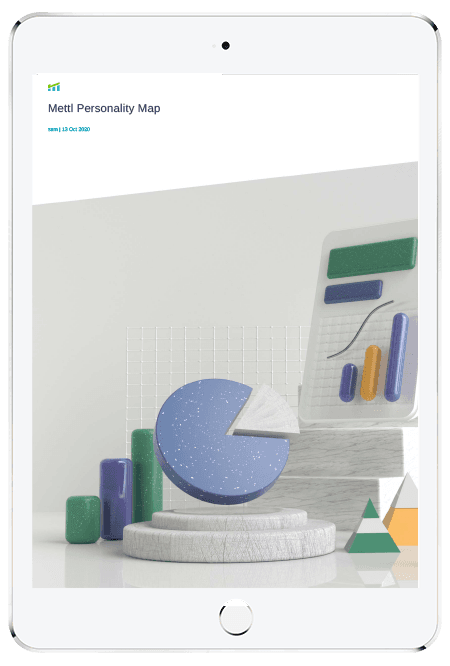Assess the candidate’s cloud computing skills with the Cloud Computing Test
The Mercer | Mettl’s Cloud Computing Test assesses a candidate’s cloud computing skills and assists organizations in making better hiring decisions and predicting candidate and employee success.
About the Mercer | Mettl Cloud Computing Test
The Mercer | Mettl’s Cloud Computing Assessment evaluates candidates' proficiency in cloud computing technologies, concepts, and services, ensuring they can effectively design, deploy, and manage cloud-based solutions. It evaluates candidates' proficiency in various cloud computing concepts, platforms, and services. It covers cloud architecture, deployment, security, and service models (IaaS, PaaS, SaaS) and management. The test evaluates the skills and knowledge required to effectively work with cloud technologies across significant AWS, Azure, and Google Cloud platforms.
What is the importance of the Cloud Computing Test?
Cloud computing refers to offering computing services via the Internet, including computer networks, servers, storage, applications, analytics, and databases. It enables users to access applications as utilities online and allows IT professionals to develop, set up, and tailor business applications in a web-based environment. The three primary categories of cloud services are IaaS (infrastructure-as-a-service), PaaS (platform-as-a-service), and SaaS (software-as-a-service). An online Cloud Computing Assessment assists recruiters and hiring managers in evaluating candidates' skills and abilities in cloud computing roles.
What is inside this Cloud Computing Test?
The Cloud Computing Test includes thirty multiple-choice questions to be answered within forty-five minutes. There are twenty questions with an intermediate level, six with a basic level and four with a difficulty level. Candidates with two to four years of experience are eligible for the test.
What skills does the Cloud Computing Test cover?
The cloud computing competency includes the following skills:
- Cloud computing - Architecture
- Cloud computing - Data storage
- Cloud computing - Virtualization
- Cloud computing - Risk issues
- Cloud computing - Cloud deployment models
- Cloud computing - Cloud service providers
- Cloud computing - Cloud networking
- Cloud computing - Cloud functions
- Cloud computing - Security
- Cloud computing - Load balancing
- Cloud computing - Infrastructure
- Cloud computing - Cloud capacity planning
What roles can you assess using the Cloud Computing Test?
- Cloud computing analyst
- Cloud computing developer
- Cloud computing engineer
How does the Cloud Computing Test help recruiters hire?
The Cloud Computing Test aids recruiters in identifying qualified candidates by assessing their technical skills and practical knowledge of cloud computing. By providing a structured and standardized way to measure candidates' abilities, recruiters can make more informed decisions in recruitment. Overall, this test streamlines the hiring process and enhances the quality of talent acquisition in cloud computing.
Sample questions for Cloud Computing Test
A. Define hybrid cloud.
-
A cloud service deployed across multiple offices or locations
-
A blend of legacy on-premises hardware and private cloud
-
Private and public cloud services blend with orchestration between them
-
None of the above
B. What is the term used when an application to the cloud is migrated by an enterprise as is without any modifications?
-
Rehost
-
Refactor
-
Rearchitect
-
Remove
C. Which models attempt to categorize a cloud network based on four-dimensional factors?
-
Cloud Cube
-
Cloud Square
-
Cloud Service
-
All of the mentioned
D. Which of the following is required by Cloud computing?
-
That the identity be authenticated
-
That the authentication be portable
-
That you establish an identity
-
All of the mentioned
E. Which of the following is incorrect about cloud computing?
-
Private cloud doesn’t employ the same level of virtualization
-
Data center operates under average loads
-
Private cloud doesn’t pool resources that a cloud computing provider can achieve
-
Abstraction enables shared, ubiquitous access, the key benefit of cloud computing
Cloud Computing Test competency framework
Get a detailed look inside the test
Cloud Computing Test competencies under scanner
Cloud computing skills
Cloud computing - Architecture Cloud computing - Data storage Cloud computing - Virtualization Cloud computing - Risk issues Cloud computing - Cloud deployment models Cloud computing - Cloud service providers Cloud computing - Cloud networking Cloud computing - Cloud functions Cloud computing - Security Cloud computing - Load balancing Cloud computing - Infrastructure Cloud computing - Cloud capacity planning
Customize this Cloud Computing Test
Flexible customization options to suit your needs
Choose easy, medium or hard questions from our skill libraries to assess candidates of different experience levels.
Add multiple skills in a single test to create an effective assessment. Assess multiple skills together.
Add, edit or bulk upload your own coding questions, MCQ, whiteboarding questions & more.
Get a tailored assessment created with the help of our subject matter experts to ensure effective screening.
The Mercer | Mettl Cloud Computing Assessment advantage
Frequently Asked Questions (FAQs)
Cloud computing has many benefits. While it allows individuals to easily access software without running it locally for personal use, businesses rely on cloud services for scalability and elasticity.
Everyone uses cloud computing, from individuals to professionals to small businesses and large corporations. Individuals use the cloud to store photos and documents, stream videos and music, collaborate with remote colleagues, and attend courses. Companies use the cloud to handle data and conduct global operations. Some jobs specific to cloud computing include cloud administrator, security engineer, and architect.

